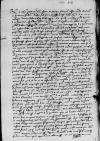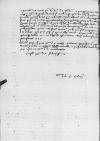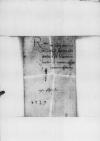Hodie sub sacro missae accepi cf. Ioannes DANTISCUS to Tiedemann GIESE Heilsberg (Lidzbark Warmiński), 1539-04-01, CIDTC IDL 2129⌊litterascf. Ioannes DANTISCUS to Tiedemann GIESE Heilsberg (Lidzbark Warmiński), 1539-04-01, CIDTC IDL 2129⌋ Reverendissimae Dominationis Vestrae cum inclusis Gdańsk Town Council ⌊dominorum GedanensiumGdańsk Town Council ⌋ et Elbing Town Council ⌊ElbingensiumElbing Town Council ⌋. Ex quibus intellexi, quid Reverendissima Dominatio Vestra statuerit respondere illustrissimo Albrecht I von Hohenzollern-Ansbach (Albrecht von Brandenburg) (*1490 – †1568), 1511-1525 Grand Master of the Teutonic Order; from 1525 to his death Duke in Prussia as a liegeman of the Polish king; son of Friedrich V of Brandenburg der Ältere and Sophia Jagiellon (daughter of Casimir IV Jagiellon), nephew of Sigismund I, King of Poland; founder of the university in Königsberg (1544)⌊domino duciAlbrecht I von Hohenzollern-Ansbach (Albrecht von Brandenburg) (*1490 – †1568), 1511-1525 Grand Master of the Teutonic Order; from 1525 to his death Duke in Prussia as a liegeman of the Polish king; son of Friedrich V of Brandenburg der Ältere and Sophia Jagiellon (daughter of Casimir IV Jagiellon), nephew of Sigismund I, King of Poland; founder of the university in Königsberg (1544)⌋ etc. Quod mihi videtur honestam quidem habere diffugiendi occasionem etc., verum pro mea erga Reverendissimam Dominationem Vestram sinceritate non dissimulabo, quid ab hac sententia nonnihil me dehortetur.
Mihi certo persuadeo Sigismund I Jagiellon (Zygmunt I) (*1467 – †1548), King of Poland and Grand Duke of Lithuania (1506-1548); Duke of Głogów (Glogau) (1499-1506), Duke of Opava (1501-1506), Governor of Silesia (1504-1506); son of King Kazimierz IV Jagiellon and Elisabeth of Austria⌊maiestatem regiamSigismund I Jagiellon (Zygmunt I) (*1467 – †1548), King of Poland and Grand Duke of Lithuania (1506-1548); Duke of Głogów (Glogau) (1499-1506), Duke of Opava (1501-1506), Governor of Silesia (1504-1506); son of King Kazimierz IV Jagiellon and Elisabeth of Austria⌋, si ad ipsam res referatur, consulturam esse, et fortasse iniuncturam nobis (quod nuper fecit), ut cum Albrecht I von Hohenzollern-Ansbach (Albrecht von Brandenburg) (*1490 – †1568), 1511-1525 Grand Master of the Teutonic Order; from 1525 to his death Duke in Prussia as a liegeman of the Polish king; son of Friedrich V of Brandenburg der Ältere and Sophia Jagiellon (daughter of Casimir IV Jagiellon), nephew of Sigismund I, King of Poland; founder of the university in Königsberg (1544)⌊domino duceAlbrecht I von Hohenzollern-Ansbach (Albrecht von Brandenburg) (*1490 – †1568), 1511-1525 Grand Master of the Teutonic Order; from 1525 to his death Duke in Prussia as a liegeman of the Polish king; son of Friedrich V of Brandenburg der Ältere and Sophia Jagiellon (daughter of Casimir IV Jagiellon), nephew of Sigismund I, King of Poland; founder of the university in Königsberg (1544)⌋ his in rebus conicemus consilia, maxime ipso eius maiestatem on the margin⌈eius maiestatemeius maiestatem on the margin⌉ urgente, ubi senserit nos eo confugere, ut solet. Ita fortasse efficietur, ut praeter nostram sententiam et nos mandata regia accipiamus et ipse suos nuntios mittat ad comitia proxima, aut si id non eveniet, tamen res extra nostram in alterius recidit potestatem, cuius non est vilis auctoritas. Satius igitur arbitrabar esse, ut res integra servaretur ad proximum conventum, ubi communi consilio decerneretur, an et quid ad Sigismund I Jagiellon (Zygmunt I) (*1467 – †1548), King of Poland and Grand Duke of Lithuania (1506-1548); Duke of Głogów (Glogau) (1499-1506), Duke of Opava (1501-1506), Governor of Silesia (1504-1506); son of King Kazimierz IV Jagiellon and Elisabeth of Austria⌊maiestatem sit regiamSigismund I Jagiellon (Zygmunt I) (*1467 – †1548), King of Poland and Grand Duke of Lithuania (1506-1548); Duke of Głogów (Glogau) (1499-1506), Duke of Opava (1501-1506), Governor of Silesia (1504-1506); son of King Kazimierz IV Jagiellon and Elisabeth of Austria⌋ sit scribendum, quid item Albrecht I von Hohenzollern-Ansbach (Albrecht von Brandenburg) (*1490 – †1568), 1511-1525 Grand Master of the Teutonic Order; from 1525 to his death Duke in Prussia as a liegeman of the Polish king; son of Friedrich V of Brandenburg der Ältere and Sophia Jagiellon (daughter of Casimir IV Jagiellon), nephew of Sigismund I, King of Poland; founder of the university in Königsberg (1544)⌊domino duciAlbrecht I von Hohenzollern-Ansbach (Albrecht von Brandenburg) (*1490 – †1568), 1511-1525 Grand Master of the Teutonic Order; from 1525 to his death Duke in Prussia as a liegeman of the Polish king; son of Friedrich V of Brandenburg der Ältere and Sophia Jagiellon (daughter of Casimir IV Jagiellon), nephew of Sigismund I, King of Poland; founder of the university in Königsberg (1544)⌋ respondendum.
Albrecht I von Hohenzollern-Ansbach (Albrecht von Brandenburg) (*1490 – †1568), 1511-1525 Grand Master of the Teutonic Order; from 1525 to his death Duke in Prussia as a liegeman of the Polish king; son of Friedrich V of Brandenburg der Ältere and Sophia Jagiellon (daughter of Casimir IV Jagiellon), nephew of Sigismund I, King of Poland; founder of the university in Königsberg (1544)⌊CuiAlbrecht I von Hohenzollern-Ansbach (Albrecht von Brandenburg) (*1490 – †1568), 1511-1525 Grand Master of the Teutonic Order; from 1525 to his death Duke in Prussia as a liegeman of the Polish king; son of Friedrich V of Brandenburg der Ältere and Sophia Jagiellon (daughter of Casimir IV Jagiellon), nephew of Sigismund I, King of Poland; founder of the university in Königsberg (1544)⌋ si nunc scribetur, rem ad regium arbitrium referri opportere, reputabit diverticula tantum quaeri, sciens iam consensisse Sigismund I Jagiellon (Zygmunt I) (*1467 – †1548), King of Poland and Grand Duke of Lithuania (1506-1548); Duke of Głogów (Glogau) (1499-1506), Duke of Opava (1501-1506), Governor of Silesia (1504-1506); son of King Kazimierz IV Jagiellon and Elisabeth of Austria⌊regemSigismund I Jagiellon (Zygmunt I) (*1467 – †1548), King of Poland and Grand Duke of Lithuania (1506-1548); Duke of Głogów (Glogau) (1499-1506), Duke of Opava (1501-1506), Governor of Silesia (1504-1506); son of King Kazimierz IV Jagiellon and Elisabeth of Austria⌋, quod obicienti negare non poterimus. Ideo tutius fortasse et simplicius esset, quod et Thorn Town Council ⌊ThorunensesThorn Town Council ⌋ consulunt, ut videlicet scribatur Albrecht I von Hohenzollern-Ansbach (Albrecht von Brandenburg) (*1490 – †1568), 1511-1525 Grand Master of the Teutonic Order; from 1525 to his death Duke in Prussia as a liegeman of the Polish king; son of Friedrich V of Brandenburg der Ältere and Sophia Jagiellon (daughter of Casimir IV Jagiellon), nephew of Sigismund I, King of Poland; founder of the university in Königsberg (1544)⌊domino duciAlbrecht I von Hohenzollern-Ansbach (Albrecht von Brandenburg) (*1490 – †1568), 1511-1525 Grand Master of the Teutonic Order; from 1525 to his death Duke in Prussia as a liegeman of the Polish king; son of Friedrich V of Brandenburg der Ältere and Sophia Jagiellon (daughter of Casimir IV Jagiellon), nephew of Sigismund I, King of Poland; founder of the university in Königsberg (1544)⌋, frustra venturos nuntios ipsius, antequam res, quae seorsim tractari nequit, communi frequenteque consilio sit digesta. Idque, ut in proximis comitiis fiat omnes probare, quod solum etiam Albrecht I von Hohenzollern-Ansbach (Albrecht von Brandenburg) (*1490 – †1568), 1511-1525 Grand Master of the Teutonic Order; from 1525 to his death Duke in Prussia as a liegeman of the Polish king; son of Friedrich V of Brandenburg der Ältere and Sophia Jagiellon (daughter of Casimir IV Jagiellon), nephew of Sigismund I, King of Poland; founder of the university in Königsberg (1544)⌊eius illustritasAlbrecht I von Hohenzollern-Ansbach (Albrecht von Brandenburg) (*1490 – †1568), 1511-1525 Grand Master of the Teutonic Order; from 1525 to his death Duke in Prussia as a liegeman of the Polish king; son of Friedrich V of Brandenburg der Ältere and Sophia Jagiellon (daughter of Casimir IV Jagiellon), nephew of Sigismund I, King of Poland; founder of the university in Königsberg (1544)⌋ petiit, quae deinde certior fiet, quid sit ea in re constitutum.
Hoc consilium si Reverendissimae Dominationi Vestrae non probatur, facile acquiesco ipsius sententiae, quam mea written over e⌈eaa written over e⌉ semper habeo potiorem. Arbitror autem decere magis, ut Reverendissima Dominatio Vestra tamquam ceterorum percontatis sententiis sola respondeat, quam ut plures scribamus. Mitto Thorn Town Council ⌊dominorum ThorunensiumThorn Town Council ⌋ ad me litteras, iunctis his, quas nunc Reverendissima Dominatio Vestra ad me misit.
Risi legens, quae de domino Alexander Sculteti (Scholtcze) (*ca. 1485 – †1570), doctor of canon law, cartographer, historian and friend of Copernicus; accused by Dantiscus and Stanisław Hozjusz (Hosius) of Sacramentarian heresy, in 1540 banished by King Sigismund I Jagiellon; in 1541 imprisoned by the Inquisition in Rome; after release from prison in 1544 he stayed in Rome for the rest of his life; 1509-1516 notary at the Roman Curia; 1519-1541 Canon of Ermland (Warmia), 1530-1539 Chancellor of the Ermland Chapter; 1536-1538 administrator of the komornictwo of Mehlsack (Melzak, today Pieniężno) (KOPICZKO 2, p. 299; SBKW, p. 219-220)⌊AlexandroAlexander Sculteti (Scholtcze) (*ca. 1485 – †1570), doctor of canon law, cartographer, historian and friend of Copernicus; accused by Dantiscus and Stanisław Hozjusz (Hosius) of Sacramentarian heresy, in 1540 banished by King Sigismund I Jagiellon; in 1541 imprisoned by the Inquisition in Rome; after release from prison in 1544 he stayed in Rome for the rest of his life; 1509-1516 notary at the Roman Curia; 1519-1541 Canon of Ermland (Warmia), 1530-1539 Chancellor of the Ermland Chapter; 1536-1538 administrator of the komornictwo of Mehlsack (Melzak, today Pieniężno) (KOPICZKO 2, p. 299; SBKW, p. 219-220)⌋ a me reverso Reverendissima Dominatio Vestra scribit, miratusque sum delatoris vafritiem, qui cum iam pridem mihi succenseat nolenti a parte sua stare, cum Reverendissimam Dominationem Vestram in se concitasset, nunc in gratiam receptus putat se ita posse ulcisci, si dissidii quippiam inter nos possit machinari, cui possem, si liberet, optimam referri gratiam. Domino Alexander Sculteti (Scholtcze) (*ca. 1485 – †1570), doctor of canon law, cartographer, historian and friend of Copernicus; accused by Dantiscus and Stanisław Hozjusz (Hosius) of Sacramentarian heresy, in 1540 banished by King Sigismund I Jagiellon; in 1541 imprisoned by the Inquisition in Rome; after release from prison in 1544 he stayed in Rome for the rest of his life; 1509-1516 notary at the Roman Curia; 1519-1541 Canon of Ermland (Warmia), 1530-1539 Chancellor of the Ermland Chapter; 1536-1538 administrator of the komornictwo of Mehlsack (Melzak, today Pieniężno) (KOPICZKO 2, p. 299; SBKW, p. 219-220)⌊AlexandroAlexander Sculteti (Scholtcze) (*ca. 1485 – †1570), doctor of canon law, cartographer, historian and friend of Copernicus; accused by Dantiscus and Stanisław Hozjusz (Hosius) of Sacramentarian heresy, in 1540 banished by King Sigismund I Jagiellon; in 1541 imprisoned by the Inquisition in Rome; after release from prison in 1544 he stayed in Rome for the rest of his life; 1509-1516 notary at the Roman Curia; 1519-1541 Canon of Ermland (Warmia), 1530-1539 Chancellor of the Ermland Chapter; 1536-1538 administrator of the komornictwo of Mehlsack (Melzak, today Pieniężno) (KOPICZKO 2, p. 299; SBKW, p. 219-220)⌋ palam dixi me aliud non esse a Reverendissima Dominatione Vestra petiturum, quam ut liceret ecclesiam per sacrum hoc tempus vacare a censurarum ignominia, discessitque ille a me, desperans vel hoc ipsum me impetraturum esse, adeo non confirmaram longe etiam maiora flagitantem. Nescio igitur, quod gaudium domum referre potuerit, nisi forte simulato solatio reficere voluit suam, cuius futtile os, si mihi esse debet fraudi, patiar quod nemo, qui illam novit, umquam iudicavit esse dignum.
Putabam autem meam fidem meaque studia eum locum apud Reverendissimam Dominationem Vestram obtinuisse, ut non possent in next line in place of crossed-out venire⌈venire possent possent in next line in place of crossed-out venire⌉ venire
 BCK, 1597, p. 662
in periculum eius metus, quem cf. Ioannes DANTISCUS to Tiedemann GIESE Heilsberg (Lidzbark Warmiński), 1539-04-01, CIDTC IDL 2129⌊litteraecf. Ioannes DANTISCUS to Tiedemann GIESE Heilsberg (Lidzbark Warmiński), 1539-04-01, CIDTC IDL 2129⌋ Reverendissimae Dominationis Vestrae ostendunt, a quo ipsam praesentibus libero, magno etiam mihi probro ducens, si in tali causa Reverendissimae Dominationi Vestrae adversarer, quam, si interdum moneo de his, quae mihi recta et tuta videntur, non in alterius gratiam quam nostrae mutuae coniunctionis et benevolentiae, quam vellem ubique sinceram servare et integram. Si meis consiliis dominus Alexander Sculteti (Scholtcze) (*ca. 1485 – †1570), doctor of canon law, cartographer, historian and friend of Copernicus; accused by Dantiscus and Stanisław Hozjusz (Hosius) of Sacramentarian heresy, in 1540 banished by King Sigismund I Jagiellon; in 1541 imprisoned by the Inquisition in Rome; after release from prison in 1544 he stayed in Rome for the rest of his life; 1509-1516 notary at the Roman Curia; 1519-1541 Canon of Ermland (Warmia), 1530-1539 Chancellor of the Ermland Chapter; 1536-1538 administrator of the komornictwo of Mehlsack (Melzak, today Pieniężno) (KOPICZKO 2, p. 299; SBKW, p. 219-220)⌊AlexanderAlexander Sculteti (Scholtcze) (*ca. 1485 – †1570), doctor of canon law, cartographer, historian and friend of Copernicus; accused by Dantiscus and Stanisław Hozjusz (Hosius) of Sacramentarian heresy, in 1540 banished by King Sigismund I Jagiellon; in 1541 imprisoned by the Inquisition in Rome; after release from prison in 1544 he stayed in Rome for the rest of his life; 1509-1516 notary at the Roman Curia; 1519-1541 Canon of Ermland (Warmia), 1530-1539 Chancellor of the Ermland Chapter; 1536-1538 administrator of the komornictwo of Mehlsack (Melzak, today Pieniężno) (KOPICZKO 2, p. 299; SBKW, p. 219-220)⌋ obsecundabit, res indicabit mihi non convenire cum his, qui sunt adversus Reverendissimam Dominationem Vestram contumaces, quod persuadere opinor mei written over ...⌈... illegible⌈...... illegible⌉eiei written over ...⌉ osores conantur, quibus quam fidem accommodare Reverendissima Dominatio Vestra debeat, ipsa sciet, quae et me et illos novit.
BCK, 1597, p. 662
in periculum eius metus, quem cf. Ioannes DANTISCUS to Tiedemann GIESE Heilsberg (Lidzbark Warmiński), 1539-04-01, CIDTC IDL 2129⌊litteraecf. Ioannes DANTISCUS to Tiedemann GIESE Heilsberg (Lidzbark Warmiński), 1539-04-01, CIDTC IDL 2129⌋ Reverendissimae Dominationis Vestrae ostendunt, a quo ipsam praesentibus libero, magno etiam mihi probro ducens, si in tali causa Reverendissimae Dominationi Vestrae adversarer, quam, si interdum moneo de his, quae mihi recta et tuta videntur, non in alterius gratiam quam nostrae mutuae coniunctionis et benevolentiae, quam vellem ubique sinceram servare et integram. Si meis consiliis dominus Alexander Sculteti (Scholtcze) (*ca. 1485 – †1570), doctor of canon law, cartographer, historian and friend of Copernicus; accused by Dantiscus and Stanisław Hozjusz (Hosius) of Sacramentarian heresy, in 1540 banished by King Sigismund I Jagiellon; in 1541 imprisoned by the Inquisition in Rome; after release from prison in 1544 he stayed in Rome for the rest of his life; 1509-1516 notary at the Roman Curia; 1519-1541 Canon of Ermland (Warmia), 1530-1539 Chancellor of the Ermland Chapter; 1536-1538 administrator of the komornictwo of Mehlsack (Melzak, today Pieniężno) (KOPICZKO 2, p. 299; SBKW, p. 219-220)⌊AlexanderAlexander Sculteti (Scholtcze) (*ca. 1485 – †1570), doctor of canon law, cartographer, historian and friend of Copernicus; accused by Dantiscus and Stanisław Hozjusz (Hosius) of Sacramentarian heresy, in 1540 banished by King Sigismund I Jagiellon; in 1541 imprisoned by the Inquisition in Rome; after release from prison in 1544 he stayed in Rome for the rest of his life; 1509-1516 notary at the Roman Curia; 1519-1541 Canon of Ermland (Warmia), 1530-1539 Chancellor of the Ermland Chapter; 1536-1538 administrator of the komornictwo of Mehlsack (Melzak, today Pieniężno) (KOPICZKO 2, p. 299; SBKW, p. 219-220)⌋ obsecundabit, res indicabit mihi non convenire cum his, qui sunt adversus Reverendissimam Dominationem Vestram contumaces, quod persuadere opinor mei written over ...⌈... illegible⌈...... illegible⌉eiei written over ...⌉ osores conantur, quibus quam fidem accommodare Reverendissima Dominatio Vestra debeat, ipsa sciet, quae et me et illos novit.
Cupio eandem diutissime optimeque valere, et in me diligendo esse immotam.
 BCK, 1597, p. 662
in periculum eius metus, quem cf.
BCK, 1597, p. 662
in periculum eius metus, quem cf. 

